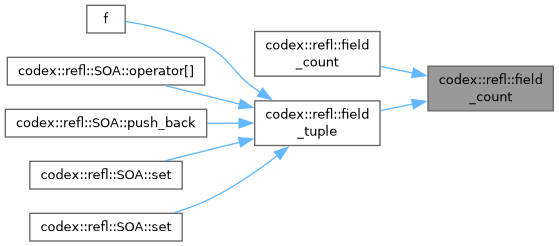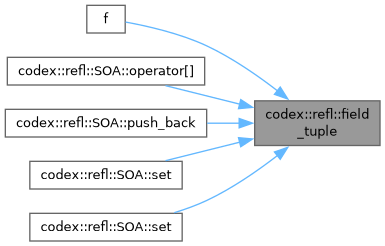Loading...
Searching...
No Matches
codex::refl Namespace Reference
Namespaces | |
| namespace | detail |
Classes | |
| class | SOA |
Transparently stores T objects as contiguous arrays of each field. More... | |
Typedefs | |
| template<typename T > | |
| using | field_tuple_t = decltype(field_tuple(std::declval<T>())) |
Alias of the tuple type returned by field_tuple for type T. | |
| template<std::size_t I> | |
| using | index_constant = std::integral_constant<std::size_t, I> |
Alias for an integral_constant of size_t. | |
Functions | |
| template<typename T , std::size_t ... N> | |
| constexpr std::size_t | field_count (void) |
Number of fields in the struct T. | |
| template<typename T , std::size_t ... N> requires (requires { T{detail::to_any<N>{}...}; }) | |
| constexpr std::size_t | field_count (void) |
Number of fields in the struct T. | |
| template<typename T > | |
| auto | field_tuple (T &&t) |
Constructs a tuple of references to each field of T, in order. | |
Typedef Documentation
◆ field_tuple_t
template<typename T >
| using codex::refl::field_tuple_t = decltype(field_tuple(std::declval<T>())) |
Alias of the tuple type returned by field_tuple for type T.
◆ index_constant
template<std::size_t I>
| using codex::refl::index_constant = std::integral_constant<std::size_t, I> |
Alias for an integral_constant of size_t.
Function Documentation
◆ field_count() [1/2]
template<typename T , std::size_t ... N>
|
constexpr |
Number of fields in the struct T.
This is the specialization that is always instantiable. It is the converse of the requires clause in the other member of the overload set, i.e. struct T cannot be constructed with N fields. Because the search is done linearly from zero, the structure must have N - 1 fields.
Here is the caller graph for this function:

◆ field_count() [2/2]
|
constexpr |
Number of fields in the struct T.
Instantiable if it is possible to construct struct T with N fields. codex::refl::detail::to_any is used so that the types of the fields are disregarded. The requires clause will hold for values of N from zero to the number of fields in T.
Here is the call graph for this function:


